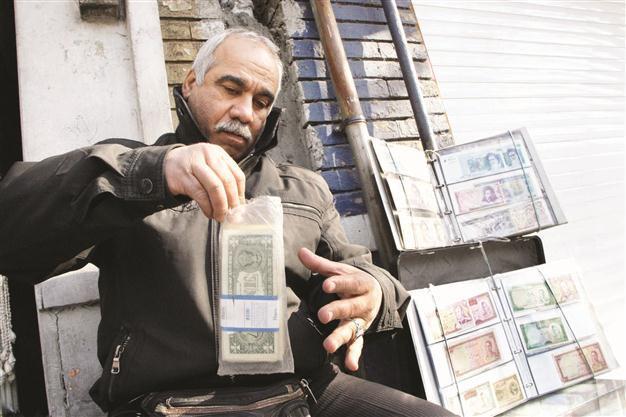Iran’s intervention in FX market turns up trumps
ISTANBUL - Hürriyet Daily News

A street money exchanger puts US dollars in a plastic bag in downtown Tehran last month. The rial was trading at 14,000 against the dollar yesterday after an intervention. AP photo
While the Turkish Central Bank’s ongoing intervention to halt the slide of the Turkish Lira against the U.S.
dollar yields mixed results at best, the intervention in
Iran has seen the value of the Iranian
Rial soar, according to agency reports.
Iran’s
currency has soared an unprecedented 21 percent in the past two days on central bank intervention, Agence France-Presse reported yesterday. The intervention came to reverse a sharp slide after the U.S. government implemented new economic
sanctions.
“On Tuesday alone, the rial posted 14 percent over its closing value on Monday in the open market, according to a specialized foreign exchange website,” AFP said.
Iran’s central bank stepped in Jan. 2 to reverse a 12 percent slide that occurred after U.S. President Barack Obama over the weekend signed into law new sanctions targeting the bank and Iran’s financial sector.
The rial was trading at 14,000 against the dollar yesterday, a much stronger level than the record-low 17,800 it was fetching early Jan. 2 before the intervention.
Iranian Commerce Minister Mehdi Ghazanfari said Jan. 3 the central bank had been asked “to inject more foreign currency into the market, and the central bank has promised to do so,” according to the official IRNA news agency.
He added the government was considering “a number of measures to control the exchange market.” He did not say what they were.
The rial’s volatility “definitely has nothing to with sanctions,” AFP quoted Foreign Ministry Spokesman Ramin Mehmanparast as saying. Head of the central bank Mahmoud Bahmani also said the sudden fall of the rial was “due to psychological effects.”
“I declare absolutely the international sanctions have not created any economic problem for the country. The enemies know that and are trying to create psychological tensions. But we won’t play their game,” Bahmani said, urging Iranians to refrain from buying dollars.
According to OPEC, Iran gets 80 percent of its foreign revenues – around $100 billion over the past year – from
oil exports.
The U.S. dollar was trading at above 1.86 liras yesterday. The Turkish currency lost nearly 20 percent against the greenback last year.
USA, euro,
